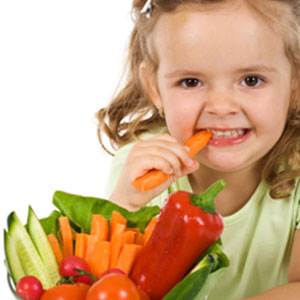
Life is stressful enough, so the last thing you want to be worrying about is whether your family is getting adequate nutrition. The Department of Health recommends at least five portions of vegetables (or fruit) a day for a healthy balanced diet.
However the fresh vegetables you bought at the supermarket have already gone bad and there isn’t always time to dash to the farmers’ market for your daily dose. So what are your alternatives?
"Frozen vegetables can provide a guilt-free solution by offering comparable nutritional values to that of fresh vegetables straight from the farm. However despite continuing global research, which has shown that frozen vegetables measure up to and may in some cases exceed expectations of fresh vegetables, frozen vegetables are still often overlooked based on habit and the misbelief that fresh is the only way to go," says Jenny Meyer, registered dietitian at MME Dietitians based in Johannesburg.
Both fresh and frozen vegetables start off from the earth, it’s only the route they take from the farm to your plate that differs.
'Just picked' nutrient value
The journey that fresh produce takes before reaching the supermarket can sometimes be over an extended period of time. It is important to use fresh vegetables as soon as possible to get the most out of them.
However the period that passes between picking, buying and consuming fresh vegetables can take up to two weeks and in that time they begin to deteriorate, losing nutritional value, taste and texture by being exposed to air and light.
In contrast, frozen vegetables are picked and frozen on the same day ensuring you are essentially getting that "just picked" nutrient value throughout.
From harvest, farm fresh vegetables are transported to the factory immediately where they are instantly steam blanched - quick steaming at a high temperature to minimise nutrient loss and deactivate the enzymes that are responsible for deterioration.
Once blanched, the vegetables are quick-frozen using a unique method of freezing that cannot be replicated in your home which locks in all their same-day goodness. From there, they are packed and delivered ensuring optimum nutrition and taste with no additives or preservatives.
For best quality, frozen foods should be kept at freezing temperatures at all times whether in the supermarket or at home. It is recommended that your home freezer temperature be maintained at -18°C and never let the vegetables thaw.
Here are 16 cool-to-know facts about frozen vegetables:
-Saving time can also save you money - by using frozen vegetables you can reduce the number of trips to the shops to purchase your weekly fresh vegetables.
-Frozen vegetables are already peeled, chopped and blanched so they require very little preparation time.
-Frozen vegetable are versatile and can be prepared in a variety of ways from steaming, boiling, roasting, stir frying or microwave preparation (see back of pack for recommended cooking methods).Steaming remains the best option of cooking to ensure optimal taste and texture.
-There is no wastage – you can use everything in the bag and anything you don’t use, you can reseal and put back into the freezer.
-Reducing waste - when it comes to fresh vegetables which are decaying in the fridge or peeling and chopping away most of the vegetable in preparation, you are losing valuable nutrients, time and ultimately money.-Portion control and convenience – when cooking with frozen you only use what you need. This allows you to control the amount you are using as you don’t have to concern yourself with waste.
-Always in season – with frozen vegetables you are able to get all your vegetables all year round.
-Freezing is ideal for preserving vegetables. It locks in colour, flavour and texture and with correct storage, vitamins and minerals too.
-One of the best ways to maintain the taste and texture of vegetables is to cook them correctly. For best results, always follow the on-pack preparation instructions.-It is important to not let frozen vegetables thaw before you cook them - always cook frozen vegetables directly from the freezer.
-To keep all the goodness sealed in, plunge the frozen vegetables into rapidly boiling water and cook for the shortest time possible. Remember to use just enough water to cover the vegetables; too much water may cause vegetables to go soggy.
-Check that the frozen vegetables you buy are frozen. Never buy product that is partly thawed and never thaw and then re-freeze frozen vegetables.
-Frozen vegetables are naturally great tasting but if you’d like to add some more flavour, rather use fresh herbs and/or spices or olive oil if you feel the need to jazz them up.
-Vegetables are best eaten al dente. Al dente is a French term which means ‘firm to the tooth’. It ensures that the vegetables are cooked through but retain a little crunch.
-Serve immediately after cooking to ensure that you retain flavour and nutritional value. The shorter the cooking time for vegetables, the less colour and nutrient loss.
(McCain Foods press release)
Read more:
Eat your veggies
Maintain your weight with fruit and veg
Living healthily




 Publications
Publications
 Partners
Partners














